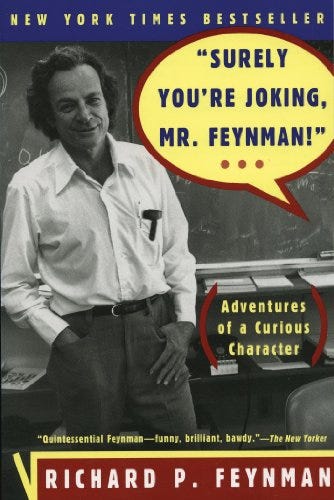High signal digest #6
Takeaways from "Surely you're joking Mr. Feynman" and 5 interesting links from this week
est reading time = 3.5 min
At a glance:
“Surely you’re joking Mr Feynman!” by Feynman = Feynman won the Nobel in physics in 1951. But he was much more than a scientist. He loved life. He was a light-hearted and adventurous guy. A character. And so this book is a series of short stories told by Feynman himself.
Feynman technique = how to learn anything. Seems logical to batch with #1
Links from this week: cheating in poker & chess, an engineer uncovers an identity theft scheme, perils of finding a co-founder, what progressives misunderstand about climate change, and why adults act like children
Why did I read this?
I am blanking on who recommended, but I recall seeing this on lists by different smart people (ex. Google founders). And then a tribute twitter account with his thoughts showed up in my feed. I found myself nodding to many of the tweets, wanted to explore further, and got the book.
“You have no responsibility to live up to what other people think you ought to accomplish. I have no responsibility to be like they expect me to be. It's their mistake, not my failing.” - Feynman
Raw notes from the book
And again, if this guy seems interesting - check out the book because there are no face-up lessons in the book. It’s ~400 pages of stories. He just tells his stories, which is cool, but it also means that my takeaways are a function of my worldview.
Learn by doing. Start out with little/no knowledge → immerse yourself → get good (or good enough)
A lot of problems are governed by similar laws. I likely know enough just to get started and from there I can learn by doing → build momentum → figure it out
Be a “positive” mentor/teacher who turns all mistakes into learning opportunities
Question things. Do not settle for what’s “given” to me, including info from “experts”. Do not be intimidated by experts either.
Think deeply about problems from the ground up on my own. I can probably crack it with enough deep thinking and enough persistence. Applies to everything.
Have fun with it. Don’t take things too seriously
Experience life. Try a bunch of stuff.
Be present
Feynman technique = how to learn anything
Feynman is known for being a polymath and his lectures were also known for being hyper simple. How did he do it? This is the Feynman technique
TLDR: study → teach → reflect + understand gaps → simplify
Study = self explanatory, but study the material. Write it down. Find patterns. Simplify and organize your knowledge.
Teach = pass on your knowledge. Explain this to someone else: friend, teammate, partner, a child (!) - anyone. Why? 2 reasons: (1) have a positive impact on another human - help them out - share what you know, (2) improve your mastery of the subject. Teaching is often a true test of mastery, but we are not done.
Reflect + understand gaps = now you will have clear understand of where you are weak. Stuck explaining XYZ concept when teaching? Hone in on that.
Simplify again = continue to simplify your knowledge. What are the simplest laws, patterns, and principles that govern this subject? By the way - this is partially why short-form text (twitter/sms) is so good as a written medium, right? It’s books/blogs distilled to the most concrete ideas.
I think this is very effective. Subliminally we’ve been using this (esp. the teaching part), but I like the reminder for simplification and I like that it connects to Feynman.
One externality from this method is that if someone can’t explain something in simple terms. If they waffle and especially if they are the “expert” - I would think twice before following their advice. There is a % chance they don’t know what they are talking about.
Eclectic links from this week
Cheating. There is a chess scandal and a poker scandal. Both are interesting for different reasons. Given what I know, I think that he (chess) cheated and she (poker) did not.
An engineer uncovers an elaborate scheme where someone pretends to be him to get jobs. Goes deep and confronts them. Be careful out there with recruiting and do take-homes!
Perils of finding a co-founder. This has been weighing on me.
What many progressives misunderstand about climate change
Why adults act like children - a look back to the 1990s in Japan to understand why some may think that adults are regressing to children. I’ve been thinking about cycles/loops in society (i.e. seek comfort → achieve comfort → go camping or media format like theatre → movies → shows → clips or how we communicate). The punchline is in the 2nd to last para (i.e. what is the strict fixed societal construct of an “adult”? ), but the whole article is kind of true and makes you think.
Examples of this kiddification can be found everywhere once you start looking. Grownups pepper their online conversations with emoji and kidspeak, like ‘adulting’ and ‘besties’, sounding suspiciously like those pioneering Japanese schoolgirls of decades past
Hugs




